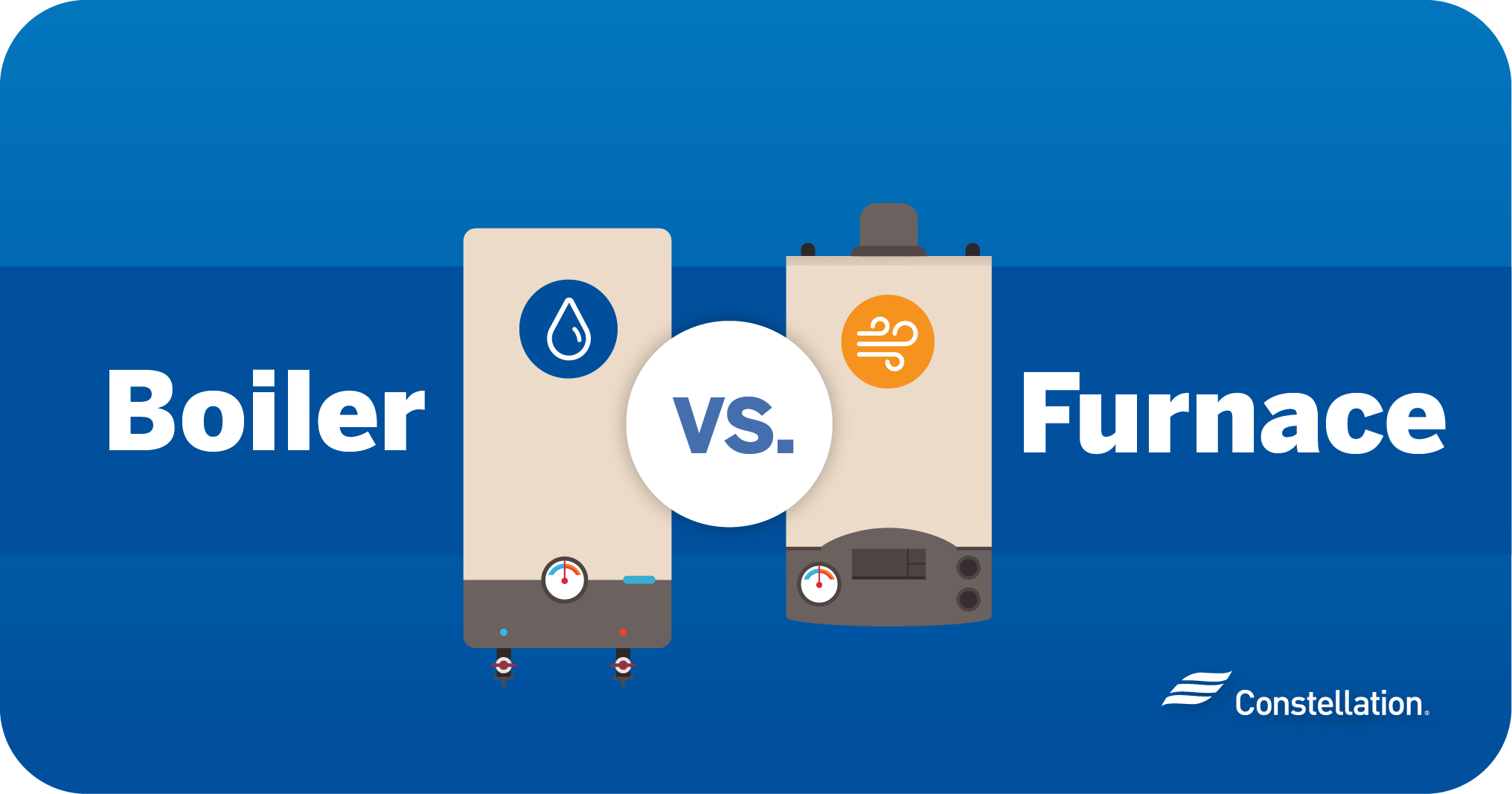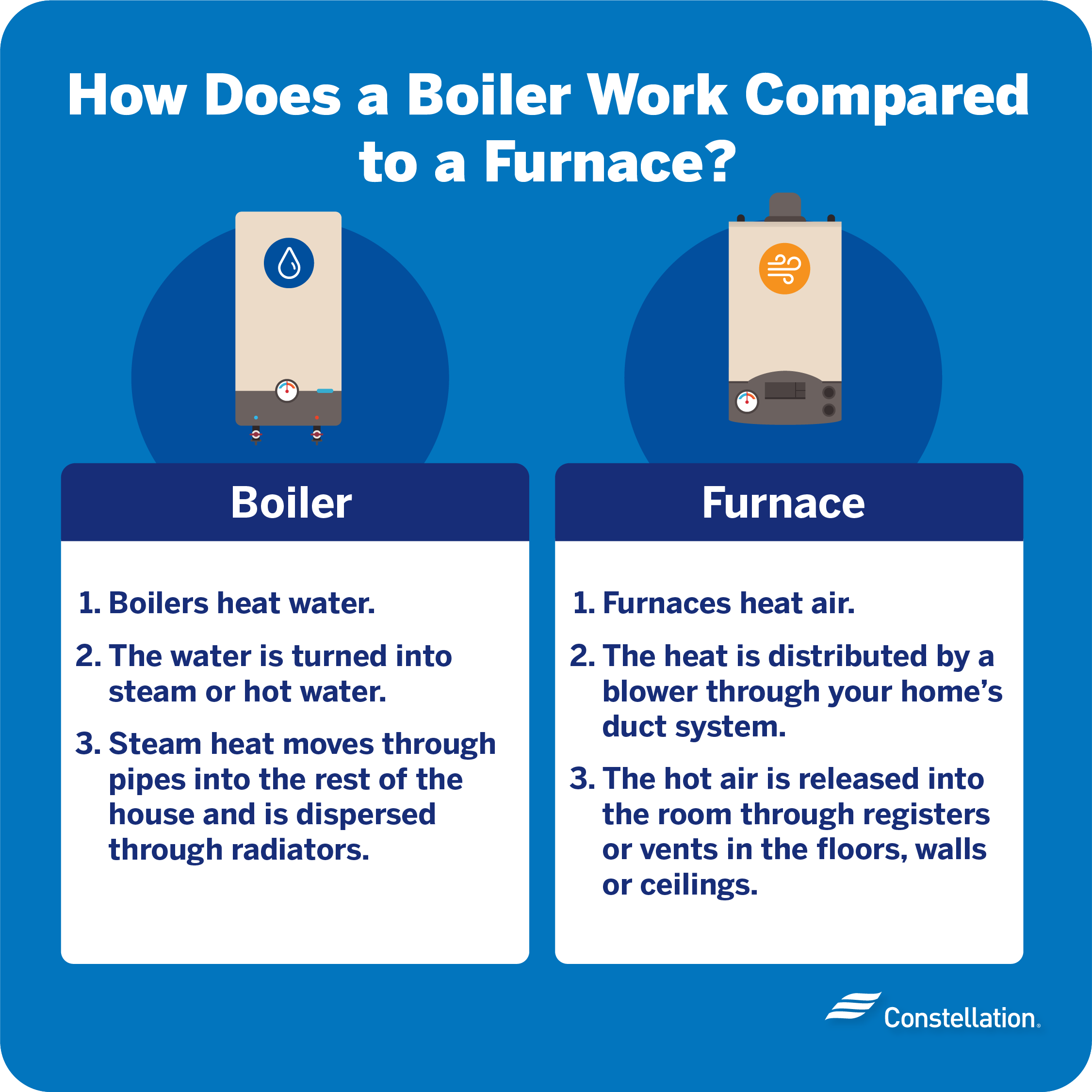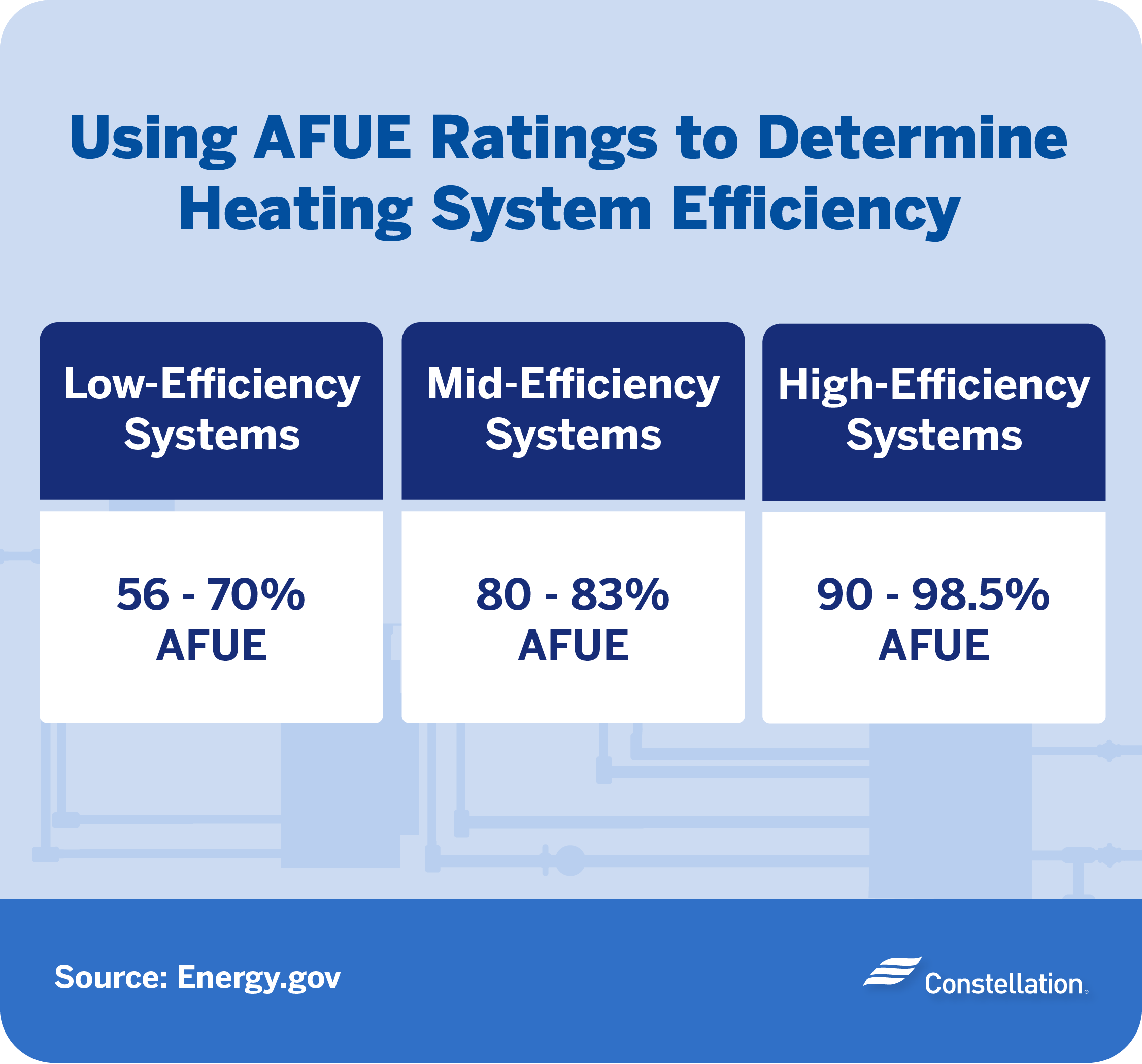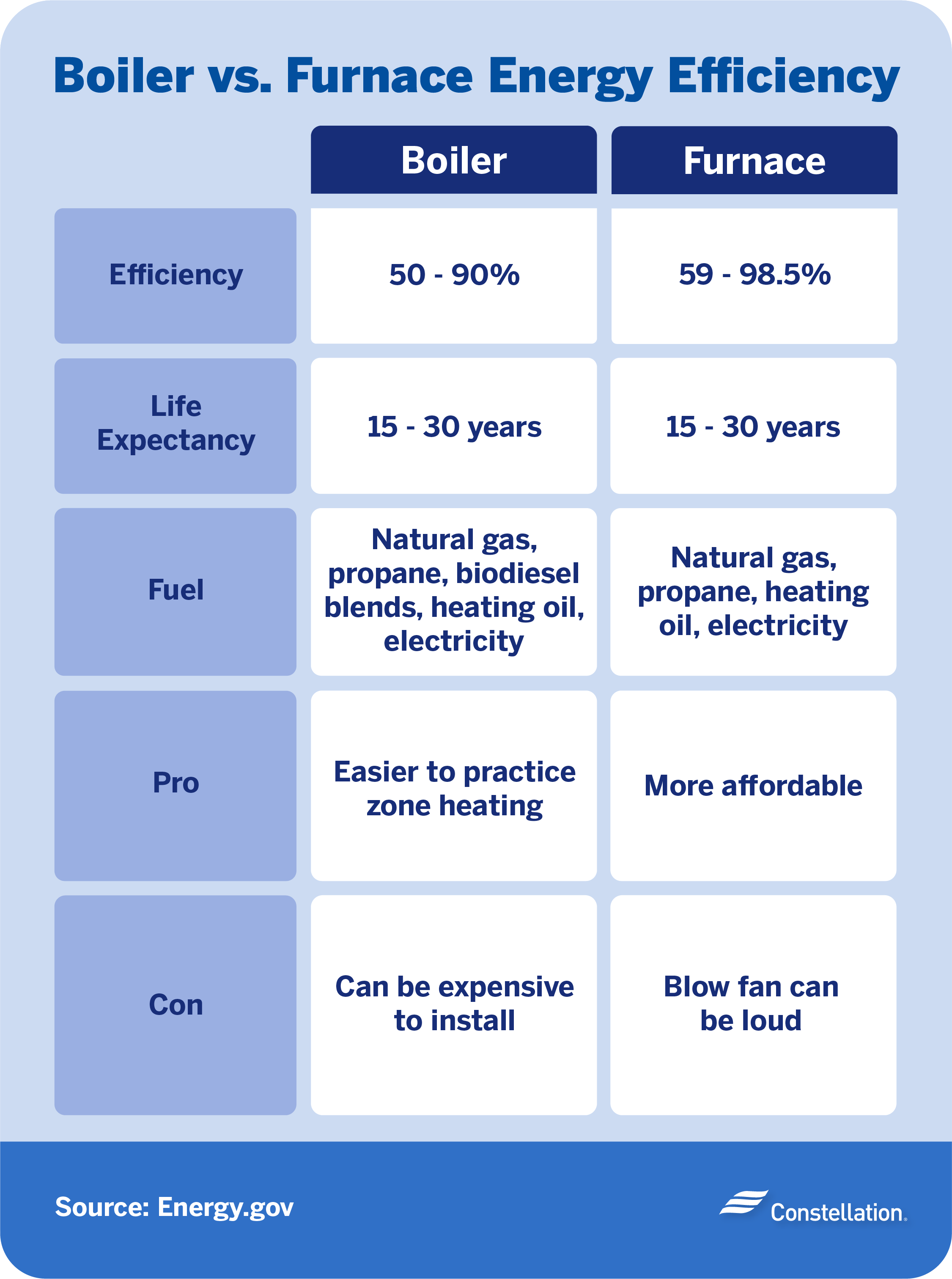
- Category:
Energy Efficiency -
Last updated:
November 22, 2023
Boiler vs. Furnace: What Are the Differences and Which Is More Energy Efficient?
In the boiler vs. furnace debate, many people don’t really know the difference between these types of systems. In fact, they often use the terms “furnace” and “boiler” interchangeably without understanding how each one works or their pros and cons. Here are the basics that can help you evaluate for yourself which is better between boiler vs. furnace.
What’s the Difference Between Boilers vs. Furnaces?
The difference between a boiler and furnace starts with how they work and that affects operating costs, upkeep and efficiency.
- A boiler heats and distributes hot water or steam through the pipes to radiators or radiant floor systems in your house.
- A furnace heats air that flows through ducts to the various rooms in your home.
How Does a Boiler Work Compared to a Furnace?

Boilers heat water:
- The water is turned into steam or hot water.
- Steam heat moves through pipes into the rest of the house and is dispersed through radiators. Hot water versions move water through baseboard radiators or radiant floor systems, or they heat air via a coil.
- Boilers run on various energy sources, including natural gas, oil, electricity, and wood.
Furnaces heat air:
- The heat is distributed by a blower through your home’s duct system. The hot air is released into the room through registers or vents in the floors, walls or ceilings.
- Also known as hot air heating systems, furnaces can run on electricity, natural gas, propane, or oil.
- Furnaces are more common in newer homes because they generally cost less than boilers. There are, however, pros and cons to each.
Which is Better: Boiler or Furnace?
Considering a boiler vs. furnace for energy efficiency in your home, here are some of the main boiler pros and cons:
Boiler pros:
- Generally more energy efficient. Boilers usually use less fuel to heat your home, which could potentially mean lower energy costs.
- More consistent heat. This could be a big consideration when pondering whether to get a furnace or boiler.
- Less operational noise. Boilers are generally quieter than furnaces because you don’t hear the sound of hot air blowing.
- Less maintenance. Boilers do not have filters that require cleaning and have fewer moving parts.
- Better air quality. Since boilers don’t blow air, they don’t spread dust or allergens.
Boiler cons:
- Slower temperature changes. Boilers take longer to adjust to thermostat changes. It takes longer for you to feel a temperature change after turning the heat up or down.
- Harder to install. Boilers are more difficult to install than furnaces.
- Harder to convert. Switching from a boiler heating system to a furnace is almost impossible. Adding the duct work to pump air through your home is cost-prohibitive. Also, boilers don’t cool homes. You will need a separate system for air conditioning.
- Leaks pose a hazard. If your boiler leaks, your home may sustain water damage.
You can also understand the difference between a boiler and a furnace through furnace pros and cons:
Furnace pros:
- Less expensive. Since furnaces are more common than boilers, they are typically less expensive.
- Reduced leak hazard. Furnaces that leak usually only leak air, which can be less damaging than water.
- No freezing hazard. The system is not in jeopardy of freezing if the power goes out. In contrast, heating pipes can freeze and potentially burst.
- Easier to install. Furnace installation typically takes a few hours as compared to days with some boiler installations.
Furnace cons:
- Less efficient. Heating with air can be less efficient than heating with water, potentially increasing your energy costs.
- More noise. Furnaces blow air, which can be noisy. You hear a furnace every time it turns on.
- Reduced heat consistency. Forced air heat is not as consistent as steam or hot water heat, making some rooms cooler or hotter than others.
- Inferior air quality. Furnaces can spread dust and allergens through your home. The air is drier in the winter so you may need to add a humidifier to the system.
Boiler vs. Furnace Installation Costs
When considering whether to go with a gas furnace vs. boiler – or a unit using a different type of fuel – the purchase price matters. The difference between a boiler and a furnace is a factor in the price tag for buying and installing one.
First considering boilers, a gas-fueled boiler will cost between $4,000 and $9,000. Propane units cost between $2,800 and $7,500 with oil running $3,300 to over $9,000. Electric boilers cost between $1,000 and $8,000.
Furnaces can be less expensive, depending on the fuel type. A propane furnace costs between $2,200 and $5,700. Those running on natural gas range between $2,000 and $5,200 and oil between $2,500 and $6,000. Electric furnaces are the least expensive type, running between $1,900 and $5,600.
Installation can be costly, particularly if you are changing fuel types and need to haul away old equipment.
Boiler vs. Furnace Monthly Energy Costs
The longer term consideration is the boiler vs furnace monthly cost. Looking at average costs is not helpful because of the wide variations across many factors.
The best way is to specifically estimate your fuel costs with your location, fuel costs, home size, and needs in mind. Calculate the amount of energy you will use and multiply that by the cost of each unit of energy. Propane and oil are measured in gallons, natural gas by therm, and electricity by kilo-watt hour. If you are in a competitive energy market, you can select among energy plans for the best prices.
The amount of energy you will use depends on the specifications of each unit you are considering, the size of your home, and how often and for how long you will run your system.
Knowing your costs will help you make the right choices to heat your home efficiently.
Boiler vs. Furnace Energy Efficiency

Your boiler vs. furnace monthly cost partly depends on the cost of fuel and partly on the heating efficiency of your system. Newer systems are dramatically more efficient than older models, with new boilers being more efficient and less expensive to operate than new furnace systems.
The U.S. Department of Energy measures heating efficiency by the annual fuel utilization efficiency or AFUE percentage. For a given amount of fuel consumed in the system,the AFUE is a percentage for how much goes to heating your house. A unit with a 70% AFUE uses 70% of energy for heat and the rest is lost through exhaust, duct work and pipes, and the mechanics of its operation.
Older furnaces or boilers have an energy efficiency AFUE measurement in the 56-70% range. Today’s systems have an efficiency rating that is as high as 98.5%. In new and highly efficient systems, practically all the energy they consume goes directly toward heating your home. Look for units with an ENERGY STAR® rating.
Upgrading your furnace or boiler to one with an AFUE in the 90%+ range can cut your heating bill almost in half. You can reduce your carbon dioxide emissions by that much or more, depending on the fuel your system uses.
Innovations that increase the efficiency, boiler vs. furnace, no matter what your fuel choice, include:
- Replacing the continuously burning pilot light with electronic ignition
- Using low energy fans to move the heat vs. relying on natural draft
- Smaller, better insulated units
- Better designed mechanical mechanisms
- Sealed combustion chambers
- Programmable thermostats
- Insulated duct work and pipes
- Secondary heat exchangers for condensing flue gasses
This chart compares boiler vs. furnace energy efficiency at a glance:

Boiler vs. Furnace Maintenance
Regardless of whether you have a furnace or a boiler, you need to take care of it to maintain its optimum operating efficiency and to extend its useful life. Money invested in system upkeep will keep your heating costs as low as possible.
For all systems:
- Check your vent connection pipe and chimney. If it isn’t working properly, you may need to replace it both for efficiency and safety.
- Check the heat exchanger.
- Adjust boiler or furnace controls to optimize settings for efficiency and comfort.
- Before replacing or retrofitting your current system, have a technician perform a combustion-efficiency test.
For forced air systems:
- Check the combustion chamber for cracks and leaks.
- Test for carbon monoxide.
- Adjust blower control and supply-air temperature.
- Clean and oil the blower.
- Remove dirt, soot or corrosion from the furnace or boiler.
- Check fuel input and flame characteristics and adjust if needed.
- Seal connections between the furnace and main ducts.
For hot water systems:
- Test the pressure-relief valve.
- Test high-limit control.
- Inspect the pressure tank, which should be filled with air only.
- Clean the heat exchanger.
For steam systems:
- Drain some water from the boiler to remove sediment and improve heat exchange efficiency.
- Test low-water cutoff safety control and high-limit safety control.
- Drain the float chamber to remove sediment and prevent clogging.
- Analyze the boiler water and add chemicals as needed to control deposits and corrosion.
- Clean the heat exchanger.
It’s a mistake to take your furnace or boiler for granted. As one of the most energy-intensive systems in your home, it pays to make sure you have the most efficient system and that it runs optimally. If your furnace or boiler is in need of a tune-up, repair, or replacement, our Constellation Home team will be happy to help you. Performing the recommended routine maintenance on your furnace or boiler is one of the heat-saving tips that trim your costs and prevent needless headaches.
Get Your Heating System Ready for Winter
In the boiler vs. furnace debate in heating your home and the all-important choice of fuel to operate it, regular maintenance is the key. It is one of the best ways to keep whatever system you are using efficient and extend its life.
Maintenance does not have to be a chore. Constellation has a reliable Home Services team that can maintain your furnace or boiler, along with other key home systems. Now is the ideal time to perform an annual tune-up. Consider a full protection plan to make maintenance effortless and effective.




